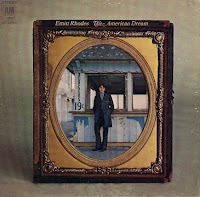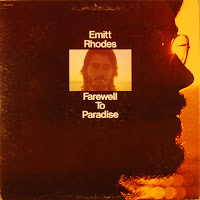Rhodes’ story is not unique, although the circumstances and experiences that pushed his artistic development certainly were. Somewhat of a child prodigy, Rhodes was playing professionally in bands in the L.A. area at the age of 14, and by the time he was old enough to get his California driver’s license, he was writing beautifully-crafted songs and fronting the folk-influenced baroque pop outfit Merry-Go-Round.
The Merry-Go-Round enjoyed a brief but moderately successful career circa
1966-69, scoring two regional hits with the Rhodes’ songs “Live” (which would
later be covered by the Bangles almost 20 years later) and “You’re A Very
Lovely Woman.” The acclaimed British folk-rock band Fairport Convention
thought enough of Rhodes’ songwriting chops to cover the band’s “Time Will
Show The Wiser” on their 1968 debut album, but by 1969 the writing was on the
wall as the Merry-Go-Round’s slight commercial fortunes waned and Rhodes
turned his attentions towards a solo career.
Emmit Rhodes’ The American Dream
Still owing A&M Records an album under the terms of the Merry-Go-Round’s contract with the label, Rhodes went into the studio with members of The Wrecking Crew, studio pros like Hal Blaine and Larry Knechtel, to cut original material to compliment a handful of leftover Merry-Go-Round tracks. The resulting album was titled The American Dream, and although Rhodes completed recording the album in 1969, it would be a couple of years before A&M would release it...more about which later. The American Dream album is where the limited-edition career retrospective The Emitt Rhodes Recordings (1969–1973) begins, the two-disc set kicking off with the original album in its entirety.
More than its entirety, really, as the song “Saturday Night” would be pulled
from subsequent pressings of The American Dream in 1971 in favor of the
minor Merry-Go-Round hit “You’re A Very Lovely Woman.” Both songs are included
here, and both are equally deserving of inclusion, the former a wistful
recollection of days passed and love lost that sounds like the Byrds minus
McGuinn’s 12-string, the latter an exotic fusing of L.A. pop and vague Middle
Eastern musical themes, the tension between the two matched by Rhodes’
acrobatic lyrics and the band’s delicious harmonies.
On the whole,
The American Dream is really just a more mature Merry-Go-Round album,
featuring a similar sort of pop sensibilities while showcasing Rhodes’ growing
songwriting savvy and a fuller, more textured sonic palette. With its lush
instrumentation and socially-conscious lyrics, the jangling “Mother Earth” is
a wonderful example of the baroque pop style, while the Beatlesque “Textile
Factory” displays a wider sense of rhythm and style with a slight countryish
twang and touches of bluegrass-styled fiddleplay. The complex “In The Days of
the Old” takes the Beatles’ Sgt. Pepper’s musical breakthroughs a step
further, matching fantasy-infused metaphorical lyrics with a spry soundtrack
and a clever vocal turn.
Released in 1970 by ABC-Dunhill, the Emitt Rhodes album – considered by many to be the songwriter’s masterpiece, and easily recognizable by its stylized cover showing Rhodes gazing through mottled windowpanes – was a twelve-song collection of finely-crafted pop-rock created entire by Rhodes and evincing a delightful whimsy to go along with its imaginative instrumentation and intelligent songwriting. Rhodes’ solo debut is often compared to Paul McCartney’s songwriting efforts, but in my mind Rhodes took the best of John Lennon and Paul McCartney and put his own unique spin on their trademark style.
Emmit Rhodes’ Mirrors
For instance, “With My Face On The Floor” sounds positively McCartneyesque,
from Rhodes’ lofty vocals right through the pop/rock instrumentation. But
Rhodes displays his own uncanny sense of popcraft, infusing the song with some
tasty guitar licks, unusual changes in direction, and an infectious chorus.
“Lullabye” is slightly more than a minute of pure melodic nirvana, Rhodes’
warm vocals caressing the lyrics, accompanied by only a fine thread of guitar
strum. The album’s single, “Fresh As A Daisy,” is a jaunty pop tune with an
infectious tick-tock beat, warm vocals stuck high in the mix, and a lovely
chorus while “You Take The Dark Out of the Night” is provided a muted,
wall-of-sound production that barely conceals Rhodes’ expressive vocals and
taut fretwork.
The success of Emitt Rhodes, the album
creeping into the Billboard “Top Thirty” chart at #29, forced A&M
Records to reconsider The American Dream. The label dusted the album
off and pushed it into the stores in early 1971, perhaps confusing Rhodes’
growing legion of fans, and competing with his own subsequently released
Mirror album. And here is where the Emitt Rhodes’ story starts to get a
little dicey, but not entirely unfamiliar for dozens…if not hundreds of
musicians that have experience similarly lugheaded and stupid corporate
hijinx. Despite the fact that Rhodes’ self-titled ABC-Dunhill album took close
to a year of dedicated studio work to craft, the executive braintrust at the
label wanted a follow-up a mere six months later, as per the ridiculous terms
of Rhodes’ contract (which, yes, he signed and thus agreed to, but really,
what’s the hurry, bub?!).
Mirror’s title track is another musically complex showcase for Rhodes’ increasingly sensitive and insightful wordplay, his lyrics complimented by a dense soundtrack and a tight thread of guitar that brings a sense of urgency to the performance. The lovely “Golden Child of God” features gossamer strings, a chameleon-like changing of sounds, multi-tracked harmonies, and an ambitious Rhodes vocal performance. “Take You Away” treads into Crosby, Still, Nash & Young territory with folkish roots, clashing vocals, and a textured guitar performance worthy of Stephen Stills. Overall, the ten songs Rhodes created for Mirror are darker, more inward-looking, and teetering on the edge of emotional meltdown. With little or no support from the label (they sued him, remember?), Mirror barely scraped onto the Billboard Top 200 album chart, and ABC-Dunhill ramped up their squeeze tactics on the singer/songwriter. As the lawsuit rolled on, and the pressures mounted, Rhodes’ took most of 1972 to create the album that would become his swansong, Farewell To Paradise.
Farewell To Paradise
Farewell To Paradise, released in 1973, would be Rhodes’ most ambitious collection yet. In many ways, the songs illustrated the singer’s growing disillusionment with the music business and his pursuit of rock ‘n’ roll stardom. Again recording entirely in his home studio and playing every instrument, Rhodes stretches his talents even further than ever before. The album-opening “Warm Self-Sacrifice” includes Rhodes’ first use of the violin, the instrument adding an air of weariness to an otherwise up-tempo arrangement. Lyrically, though, Rhodes is beginning to show the strain, a certain amount of self-defeat and self-doubt evident across several of the songs on Farewell To Paradise.
It may have been Rhodes’ final album, but the dozen songs on Farewell To Paradise display no deterioration of talent. Quite the contrary, actually, as the aforementioned “Warm Self-Sacrifice” and songs like the bluesy “See No Evil,” with its baroque pop undertones, or the bluegrass/country-styled “Blue Horizon” showing a further expansion of not only style but performance as well. The latter, particularly, is a wistful look back at what might have been, a metaphorical acceptance of Rhodes’ future departure from a flagging career. “Only Lovers Decide” may be one of the best songs that Rhodes ever wrote, a folk-influenced musing on relationships with brilliant imagery and a poetic sensibility floating above a beautiful, albeit dark-hued soundtrack with masterful piano, haunting strings, and strains of provocative fretwork. The rollicking “Bad Man” is an unabashed rocker with a slight boogie beat and Rhodes’ understated vocals while the title track is a perfect snapshot of Rhodes’ talents, blending a multi-textured musical backdrop with his typically fluid wordplay and a difficult, but ultimately successful vocal turn.The Emitt Rhodes Recordings (1969-1973) also includes “Tame The Lion,” a non-LP track released as a single by ABC-Dunhill in 1972 as a stopgap before Farewell To Paradise was completed. A timely anti-war song with vocals reminiscent of Paul McCartney and a song structure similar to some of Paul Simon’s later work, “Tame the Lion” is a good song with clever turns of a phrase supported by an up-tempo soundtrack and impressive, hard-rocking guitarplay. A companion piece, of sorts, with “Those That Die” from Farewell To Paradise, the song woulda, coulda, shoulda been a huge hit with just a small push from Rhodes’ under-appreciative label. Following the disappointing lack of success of Farewell To Paradise, Rhodes simply walked away from his recorded career at the age of 24. A veteran of nearly a decade in the competitive and pressure-filled trenches of the pop-rock rat-race, Rhodes would subsequently become a producer and A&R repre¬sentative for Elektra and Asylum Records. Later, he would retreat to his own recording studio, built in a house across the street from his childhood home, where Rhodes would record other artists while reportedly (and hopefully) amassing a wealth of unreleased songs.
Through the ensuing years, Emitt Rhodes has been saddled with a sort of “savior of pop” albatross that has only added to his cult status among a growing crowd of fans. The Internet has made legends out of more than one obscure musician, but in Rhodes’ case the adoration and renewed attention is certainly well-deserved. Listening to his early ‘70s recordings today, one must marvel not only at the technical proficiency displayed by the trio of ABC-Dunhill releases, recorded in (primitive, by today’s standards) Rhodes’ home studio, but also at the warmth and density of the sound that he achieved. Throw in Rhodes’ prescient songwriting skills (really, all that stuff that you’ve heard folks like Paul Simon, Harry Nilsson, and Matthew Sweet, to name but three, create in the late ‘70s and ‘80s is but a reflection of what Rhodes had already done) and his overlooked and often under-appreciated instrumental talents, and you have the makings of an artist that was decades ahead of his time.
The Reverend’s Bottom Line
The Emitt Rhodes Recordings (1969-1973) collects all four of the singer/songwriter’s long out-of-print albums, as well as that one lone single release – 48 songs total – into an impressive two-CD set complete with pristine remastered sound, and a CD booklet with informative liner notes and a handful of rare photos. If you’re a fan of Beatlesque pop, and you’re not familiar with Emitt Rhodes, you owe it to yourself to discover one of the 20th century’s most talented and unheralded cult legends, an artist who is just now beginning to receive the acclaim he earned almost four decades ago. (Hip-O Select, released June 11, 2009)
Editor’s Note: Rhodes returned to the music world in 2016 with the
critically-acclaimed album Rainbow Ends, which would achieve the
highest chart position (#150) of his career. Rhodes passed away in July 2020
at the age of 70.
Review originally published by the Trademark of Quality (TMQ) blog, 2009






No comments:
Post a Comment
Note: Only a member of this blog may post a comment.